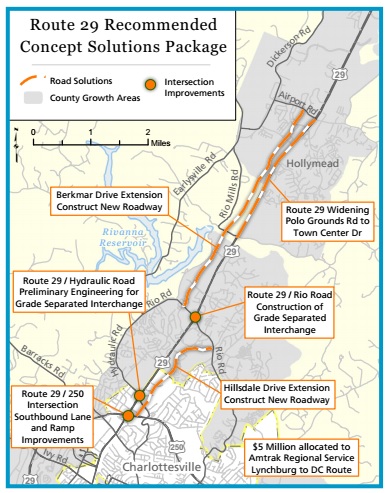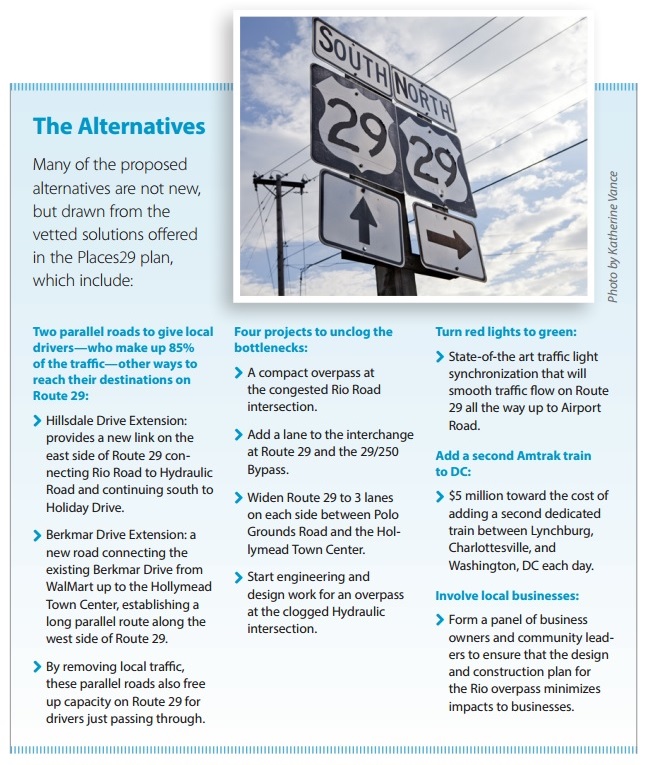Big things are happening, or rather not happening, with the costly Western Bypass of U.S. Route 29 just north of Charlottesville. We’re enthusiastic to report that the ineffective project has come to a halt, and we’re hoping this time it will be a permanent road block. With the Bypass off the table, we can finally get to work on fixing Route 29 for the majority of its travelers.
What Happened?

At a special public hearing on Feb. 19, 2014, the Albemarle County Board of Supervisors took a strong stance in opposition to the Bypass. The meeting was packed from wall to wall, and early on, some big news broke: the Federal Highway Administration had sent a letter to the state calling for additional study on the project’s purpose and need. Along with the reevaluation of the Bypass, the letter specifically asked VDOT to “reopen the consideration of alternatives.”
As the 5-hour hearing came to a close, the Board of Supervisors passed a resolution (5-1) to reinstate their opposition to the Bypass and request that VDOT focus their attention on real solutions to congestion on Route 29 and transfer any available funding to the projects laid out in Places29.
Some Background
Over the past 30 years, every time VDOT has studied traffic congestion on Route 29 north of Charlottesville, they have found that there is no silver bullet. No single bypass or road would fix the problem. All of their studies have shown that a series of improvements are needed, and that they should be implemented in a specific sequence. In 1990, the Commonwealth Transportation Board adopted a plan according to these findings.
VDOT had concluded that roughly 85% of the traffic along the Route 29 corridor was local. Their data showed that the construction of the Bypass alone would not alleviate congestion on Route 29. So, the state was only going to consider constructing a Bypass after other more critical improvements on Route 29 were completed.
Complicating matters, some businesses along the corridor began vigorously opposing the local improvements, particularly at Hydraulic and Rio roads, claiming they would turn Route 29 into an expressway and harm their business.
In a twist worthy of a Grisham novel, one of these business owners was appointed to the CTB. In 1995, without public notice or a hearing, he engineered a reversal of the approved sequencing agreement. The Bypass was leapfrogged ahead of the improvements at Hydraulic and Rio roads.
Subsequently, while the widening of Route 29 was completed in the late 1990s, the sequencing agreement was abandoned and the necessary solutions were shelved. Then, VDOT accelerated its acquisition of property for the Bypass.

In 2003, after the courts responded to a 1998 legal challenge by the Southern Environmental Law Center on behalf of PEC and the Sierra Club, efforts to revive the Bypass were held in place primarily due to a lack of federal funds for its construction and an opposition from members of the Metropolitan Planning Organization (a federally mandated organization made up of city and county elected officials and a representative from VDOT).
Without funding or support from the MPO, the project stalled, but was not forgotten by its proponents (or by PEC staff for that matter). In a surprise move during the summer of 2011, after years in the dustbin, and with virtually no public notice, the Board of Supervisors voted (4-2) to rescind the county’s long-held opposition to the Bypass. Urged on by the McDonnell Administration, The CTB quickly resurrected the project and, with unprecedented speed, awarded a contract for the design and construction of the road.
Backlash to the project began immediately. Local and regional organizations, state policy makers and some local officials questioned the Bypass’s price tag, its effectiveness and the process by which the road had been resurrected.
In the fall of 2012, we were encouraged when both the EPA and the Army Corps of Engineers questioned the effectiveness of the Bypass and the draft Environmental Assessment for the project. The agencies pointed out that VDOT hadn’t adequately compared the road to alternatives—such as the community’s Places29 plan, which offers far more cost-effective options to relieve congestion on U.S. 29.
Where Things Stand
Since February of this year, when the Board of Supervisors passed a resolution to reinstate their opposition to the Bypass, things have been moving in a positive direction. In March, the Secretary of Transportation assembled a 10-person panel to assist with the study of alternative options to improve the corridor, and he suggested at least $200 million should be reallocated from the Bypass plan to support the alternatives. As of now, the head of the panel said the Bypass would not be included in their recommendations.
The new package contains full funding for many of the solutions the community has developed and endorsed over the past two decades.
This package of solutions, if approved by the CTB, will result in a huge step forward in addressing traffic and congestion concerns on U.S. 29. The total cost of the alternatives comes to $203 million, which satisfies the requested minimum budget suggested by the Secretary of Transportation.
In a public hearing on May 27, the Board of Supervisors voted (5-1) to endorse the proposed package of improvements and request that the CTB approve the package and instruct VDOT to move forward with implementation at their next meeting. The next day, May 28, the local MPO unanimously passed a similar resolution.
“For the past 15 years, I’ve been fighting for real solutions for Route 29, and partners at SELC, CATCO, ASAP, the Sierra Club, the League of Women Voters and others have been here all along too,” said Jeff Werner, land use field officer for Albemarle County at PEC. “But what ultimately won the day were the hundreds of local citizens who have remained committed to seeing real and effective improvements implemented on Route 29.”
This article was featured in our Summer 2014 Member Newsletter, The Piedmont View.
